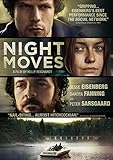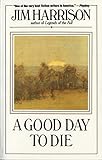
1.
 Night Moves, the latest movie from Kelly Reichardt, joins a chorus of films and books that have spent the past several decades posing an intriguing question. To paraphrase the great English pop artist Richard Hamilton, the question is this: Just what is it that makes today’s eco-terrorists so different, so appealing?
Night Moves, the latest movie from Kelly Reichardt, joins a chorus of films and books that have spent the past several decades posing an intriguing question. To paraphrase the great English pop artist Richard Hamilton, the question is this: Just what is it that makes today’s eco-terrorists so different, so appealing?
The operative word here is appealing because Reichardt and company are drawn to something in the character of people who are willing to break the law in order to perform a service they see as vital to mankind and the planet. This moral ambiguity – the willingness to do wrong in order to do right – is a large part of the eco-terrorist’s appeal. Yet this is also where things get complicated. In Night Moves, the lofty ideals of the eco-terrorists become as compromised and distorted as those of the villains they are trying to fight. Try as they might to see the world as a simple black-and-white Manichaean snapshot, Reichardt’s characters keep getting sucked into pools of gray, those murky zones of moral ambiguity that have a way of perverting even the noblest of intentions.
Night Moves, co-written by Reichardt and Jonathan Raymond, is the story of three people who share vague misgivings about ecological degradation – and a fierce determination to do something about it. At the center of the group is Josh, played brilliantly by Jesse Eisenberg. A young man so uncomfortable in his skin he’ll make you itch, Josh wears a constant scowl and says as few words as possible, preferring to let his slouchy, shuffling body language do the talking. Along for the ride is Dena (Dakota Fanning), a young woman who works at a spa and smolders with quiet rage. The closest the movie comes to exploring these characters’ motivation is when Dena vilifies the hundreds of dams on rivers throughout the West: “They’re killing all the salmon so you can run your fucking iPod every minute of your life.” That’s it for philosophy. And in Reichardt’s skilled hands, it’s exactly enough.
With the help of an ex-Marine named Harmon (Peter Sarsgaard), Josh and Dena set out to make the bomb that will blow up a hydroelectric dam on an Oregon river. Reichardt has made a counter-intuitive decision that pays off: rather than dwelling on her characters’ motivations, the why of their mission, she focuses on the how, the mundane process of buying a boat, buying a large quantity of fertilizer, packing the explosives, loading them into the boat, getting the boat to the target, detonating the charge. You begin to realize you’re watching something ingeniously twisted: the banality of evil masquerading as virtue.
The climactic explosion is downplayed – it’s just a distant burst of orange light and a muted boom – because Reichardt’s true concern is the aftermath of the act, how it will change her characters. The founder of the organic farm where Josh works dismisses the bombing as a spit in the ocean, a feckless piece of “theater” by some misguided do-gooders – because there are dozens more dams on that river alone. Then the screws tighten. The three eco-terrorists are stung to learn that a man camping downriver drowned in the torrent released by their bomb.
It soon becomes apparent that the sting comes not from guilt, but from fear and paranoia – they’re now wanted for murder as well as sabotage, and no one in the troika is sure who can be trusted. I won’t spoil the ending for you, but I will say that the high moral ground proves to be a slippery, treacherous and, finally, lethal place. Lofty motives turn out to mean very little when idealists are trying to save their own hides. Having the courage to lay bare this unpretty truth is what turns Night Moves into a fine dark work of art.
2.
 In his 2011 documentary film, If a Tree Falls: A Story of the Earth Liberation Front, Marshall Curry looked at eco-terrorists through a very different lens. A nuanced portrait of the loose band of saboteurs who wreaked havoc in the Pacific Northwest at the turn of the century, the movie is immaculately free of platitudes, stereotypes or hysteria.
In his 2011 documentary film, If a Tree Falls: A Story of the Earth Liberation Front, Marshall Curry looked at eco-terrorists through a very different lens. A nuanced portrait of the loose band of saboteurs who wreaked havoc in the Pacific Northwest at the turn of the century, the movie is immaculately free of platitudes, stereotypes or hysteria.
The film focuses on Daniel McGowan, the son of a Brooklyn cop who experiences a “sense of mourning” once he becomes aware of mankind’s many environmental sins. He participates in multiple acts of arson as ELF cells launch a freelance sabotage campaign against lumber mills, logging equipment, horse corrals, meat-packing plants, genetics labs, tree farms, even ski resorts. Hovering over the film is a question: Are these activists terrorists, as the government would have us believe, or are they avenging angels performing a vital service, as they themselves believe? Curry, to his credit, refuses to offer a tidy answer.
Instead he gives us one cop who grudgingly admits, “They were really good at what they did.” And a prosecutor who says, “Once you start looking at their motivations and childhoods, instead of seeing a mug shot you start to understand them and how it came to pass that they started doing this.” A lumber company owner points out that his workers plant six trees for every one they cut down, as required by Oregon law – hardly the work of black-hatted villains. In retrospect, McGowan realizes he should have questioned the effectiveness of setting a fire at a lumber mill. “Did this action push them in a better direction?” he asks. “That’s a good question. But at the time I wasn’t asking it.”
McGowan’s major crisis comes when it’s revealed that an ELF arson attack on a tree farm was based on bad intelligence: the farm was not involved in genetic engineering, as the saboteurs had believed. Though no one was hurt, this botched operation eventually leads McGowan to drift away from the movement and melt back into normal society.
Years later, while he’s working in an office in New York City, federal agents swarm in to arrest him on charges of arson and conspiracy. It turns out that an old ELF foot soldier named Jake Ferguson had decided to cooperate with the authorities to avoid prosecution. Ferguson spent a year visiting and telephoning friends, including McGowan, while wearing a wire. Again we see just how little lofty ideals mean when idealists are trying to save their own hides.
As McGowan’s case moves through the courts, his lawyer notes that not a single human being was harmed in any of the more than 1,000 acts of sabotage ELF conducted. (Compare this with the track record of the trio in Night Moves.) She adds that a fair definition of terrorism would be a politically motivated act that results in the end of innocent human life – such as flying commercial airplanes into skyscrapers, or shooting them down with missiles.
As he prepares to start serving a 7-year prison sentence at the end of the movie, McGowan makes the claim that eco-terrorism, like so many things, boils down to semantics. “People need to question this new buzzword, terrorism,” he says. “It’s the new communism, the new bogeyman.” Indeed, The Intercept, an online magazine, has just revealed that the U.S. government has 20,800 citizens and permanent residents on a database of people suspected of having links to “terrorism.”
To underscore his point, McGowan wears a t-shirt with a picture of George W. Bush above the words International Terrorist. The movie, which was nominated for an Academy Award, ends with a bitter coda: Ferguson, the snitch, did not do any time in prison.
3.
 Like many good movies, Night Moves and If a Tree Falls led me back to books. In 1973, when the environmental movement was in its infancy, Jim Harrison published a novella called A Good Day to Die. It’s narrated by a booziferous fisherman who meets an unhinged Vietnam vet named Tim in a Key West bar. On a lark they decide to drive out West and blow up a dam. En route they stop in Valdosta, Georgia, to pick up the vet’s girlfriend, a leggy knockout named Sylvia who instantly infects the narrator with a rabid case of puppy love. And so, fueled by uppers, booze, weed, and lust, this lopsided love triangle hits the road.
Like many good movies, Night Moves and If a Tree Falls led me back to books. In 1973, when the environmental movement was in its infancy, Jim Harrison published a novella called A Good Day to Die. It’s narrated by a booziferous fisherman who meets an unhinged Vietnam vet named Tim in a Key West bar. On a lark they decide to drive out West and blow up a dam. En route they stop in Valdosta, Georgia, to pick up the vet’s girlfriend, a leggy knockout named Sylvia who instantly infects the narrator with a rabid case of puppy love. And so, fueled by uppers, booze, weed, and lust, this lopsided love triangle hits the road.
Like the characters in Night Moves, this trio is motivated by fuzzy misgivings. Here’s how the narrator expresses those misgivings to a group of stoned people at a party: “My voice became tight and humorless as I began a tirade against realtors, land developers and lumber companies. In a few years there wouldn’t be much worth looking at and if anyone in the room planned on having a son there wouldn’t be any rivers or forests left and our sons wouldn’t have any fishing and hunting. What was needed was some sort of Irgun like the Israelis had when they drove out the British. Some men brave enough to blow up dams and machinery.”
What makes this mission fascinating is its mix of loopiness and dead seriousness. It was spawned by a stray remark – the narrator making the bogus claim that the government was building a dam on the Colorado River that would turn the Grand Canyon into a giant lake. As the narrator admits, “I had a rather yellow sense in my belly that the whole project was ten degrees off in the direction of wacky.” He even admits that he’s a less than passionate idealist: “If we blew up some dam it would have a sort of final interest to it like a fishing record that couldn’t be taken away from you.”
But as the mission proceeds to a new target in Idaho, there’s nothing bogus about the fertilizer, kerosene and dynamite the group acquires. In the end, these half-assed eco-terrorists are undone not by their loopiness, but by their erratic compassion for the natural world. Tim doesn’t hesitate to kill a troublesome watchdog, but when cows shuffle onto the targeted dam after he has lit the fuse, he frantically tries to shoo them away. A fatal mistake – but hardly surprising, given the air of doom that pervaded this ill-conceived and colossally bungled mission.
After the fatal explosion, the narrator echoes Josh from Night Moves: “I was frankly interested in saving my own skin.” Part of what makes today’s eco-terrorists so appealing, it turns out, is that their feet are sometimes made of clay.
4.
 Two years after A Good Day to Die was published, Edward Abbey came out with The Monkey Wrench Gang, a novel that owed a clear debt to Harrison’s book and went on to become a cult classic and the unofficial Bible of the radical environmental group Earth First!, a precursor to the Earth Liberation Front.
Two years after A Good Day to Die was published, Edward Abbey came out with The Monkey Wrench Gang, a novel that owed a clear debt to Harrison’s book and went on to become a cult classic and the unofficial Bible of the radical environmental group Earth First!, a precursor to the Earth Liberation Front.
Round up the usual suspects. Abbey’s cast consists of an unhinged Vietnam vet with training in explosives (again!), a cantankerous river guide, a Tucson surgeon and his hottie girlfriend (again!). They set out on a campaign of equal-opportunity sabotage, toppling billboards and power lines, pulling up survey stakes, cutting barbed-wire fences, destroying road-building machinery, trashing helicopters, blowing up bridges. Their ultimate goal is to blow up the Glen Canyon Dam, a bête noir of radical environmentalists. All the while they’re guided by an iron credo that Earth First! and ELF would eventually adopt: “No harm to human beings.” (A lopsided love triangle also develops, not unlike the one in A Good Day to Die. All that proximity to explosives and death seems make eco-terrorists spectacularly horny.)
It’s worth noting that Abbey’s master’s thesis at the University of New Mexico in 1956 was titled “Anarchy and the Morality of Violence,” and he spent years pulling up survey stakes and knocking down billboards before he started writing his masterpiece. He also drove a vintage red Cadillac convertible, and his characters blithely toss their empty beer cans out of car windows – hardly the acts of card-carrying eco-purists.
But let’s not quibble. Abbey’s book is a satire, a broad one at that. Unlike Reichardt and Harrison, he gets positively expansive when it comes to delineating his characters’ motivation for their eco-terror campaign. At one point the surgeon, Doc Sarvis, is thinking:
All this fantastic effort – giant machines, road networks, strip mines, conveyor belts, pipelines, slurry lines, loading towers, railway and electric train, hundred-million-dollar coal-burning plant; ten thousand miles of high-tension towers and high-voltage lines; the devastation of the landscape, the destruction of Indian homes…all that ball-breaking labor and all that backbreaking expense and all that heartbreaking insult to land and sky and human heart, for what? Why, to light the lamps of Phoenix suburbs not yet built, to run the air-conditioners of San Diego and Los Angeles…Las Vegas, Albuquerque, Tucson, Salt Lake City, the amalgamated metropoli of southern California, to keep alive that phosphorescent putrefying glory (all the glory there is left) called Down Town, Night Time, Wonderville, U.S.A.
Nobody every accused Abbey of being subtle, and that’s a large part of his appeal – his willingness to go over the top at all times. After all, the stakes are huge, nothing less than his beloved adopted southwest desert (he was born in Pennsylvania), nothing less than planet Earth herself.
Part of the appeal of Abbey’s characters is that they, too, have trouble living up to their credo. Hayduke, the former Green Beret, is no stranger to violence, and he regularly has to be talked out of shooting cops and rangers. And at a critical juncture in the story, the posse of eco-saboteurs nearly makes a tragic mistake much like the one in Night Moves. They’re getting ready to blow up a bridge as a train loaded with coal crosses it. They believe the train is automated, but at the last moment they look down, in horror, to see an engineer in the cab of the locomotive, waving at them. Abbey lets his characters off the hook when the charges explode and the engineer jumps to safety as the train slides into the river.
Writing in the New York Times, Harrison let Abbey off the hook too: “Abbey trips a bit over the question of violence to people but an ideological gaffe is easily forgivable contrasted to the heroics, the sense the reader has of wanting them to ‘get away with it.’”
An ideological gaffe? Every character in each of these books and movies is torn by warring ideologies – the urge to do good versus the need to set limits on how much harm they’re willing to do in order to do good. This struggle to live within those limits is what makes eco-terrorists so appealing. And when they fail, as they do in Night Moves and A Good Day to Die, they shade from appealing all the way to appalling. And it’s a fascinating thing to see.








